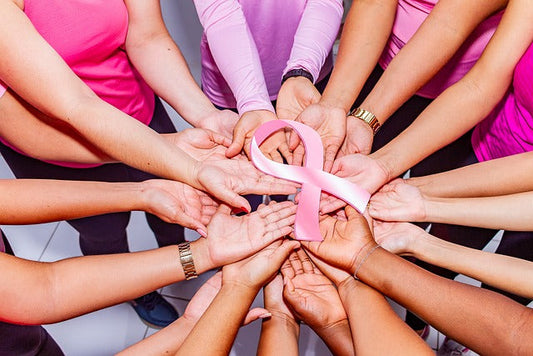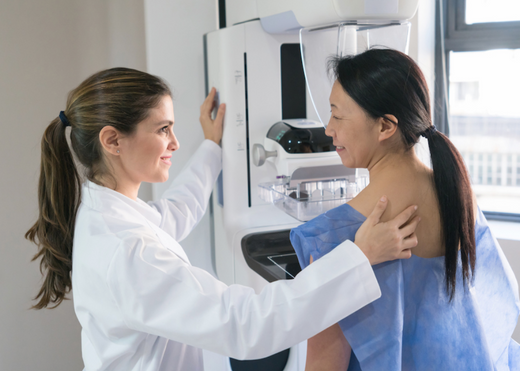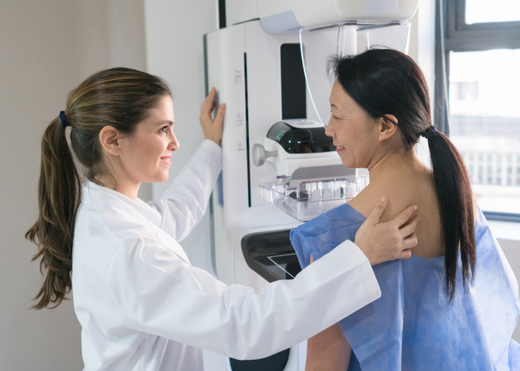What Happens At A Mammogram?
Find out moreA mammogram, or breast cancer screening, is a low-dose X-ray that a specialist radiographer, called a mammographer, does to examine the breast tissue for changes and abnormalities.
In this article, we look at what a mammogram detects, how often you should have a breast screening, and what happens before, during and after your appointment.
What can a mammogram detect?
There are two reasons a mammogram may be done — as a screening or for diagnostic purposes.
A screening mammogram (breast screen) identifies breast changes in cases where there are no signs or symptoms. The aim is to detect cancer in its earliest stages when it’s most treatable.
A diagnostic mammogram investigates suspicious changes in your breast, such as a new lump, pain, changes in skin appearance or nipple thickening or discharge.
Whether you are having a regular screening or diagnostic mammogram, your radiologist will check the X-rays of your breast for any changes in the tissue. A change could be small white spots called calcifications (which are often harmless), abnormal areas known as masses or cysts, and suspicious findings that could be signs of breast cancer.
If you’ve had mammograms before, your radiologist will likely compare your latest screening to previous images to look for changes.
How often should you have a screening mammogram?
Any UK resident registered with a GP will be invited for their first screening mammogram between the ages of 50 and 53. Once you’ve had your first mammogram, your GP will invite you to have one every three years until the age of 71.
Although you’ll no longer be automatically invited for a mammogram past 71, you can still book a breast screening every three years if you want to.
If you notice any of the changes to your breast mentioned above, at any age, you should contact your doctor. They will examine you and may refer you for further investigations that may include a mammogram or a breast ultrasound scan.
For more information, please read our article on how often you should have a mammogram.
How to prepare for a mammogram appointment
Here are a few things to do or keep in mind when scheduling your mammogram. Make sure you share the following information with the person booking your appointment if any of these apply to you:
- You’re breastfeeding, pregnant or think you may be pregnant
- You’ll be menstruating on the date suggested — your breasts may be tender, making the screening uncomfortable
- You have breast implants
- You have recently had a vaccination
- You have a pacemaker or other medical device in your body
On the day of your mammogram, it’s essential not to use talcum powder, deodorant, lotions or creams under your arms, as these products can interfere with the mammogram.
You’ll need to undress from the waist up for the screening, so it’s a good idea to wear a separate top and bottoms rather than a dress or an all-in-one outfit.
What happens at a mammogram?
At your breast screening, your mammographer will take two X-rays of each breast.
Before your screening, your mammographer will ask if you’ve noticed any changes in your breasts, explain the screening to you and answer any questions you may have.
Your breast screening will follow these steps:
- You’ll undress from the waist up and put on a hospital gown. You’ll also need to remove any jewellery.
- You'll enter the X-ray room where your mammographer will explain what will happen.
- The mammographer will place your breast on the X-ray machine. The machine squeezes it between two plates of plastic to hold it still while the X-rays are taken.
- The mammographer rotates the X-ray machine to take images on the other side of your breast.
- They will repeat the process on your other breast.
- When the screening is done, you’ll get redressed.
Mammograms only take a few minutes. The appointment should last around 30 minutes.
What to expect after a mammogram
The pressure applied to the breasts to keep them still during screening can be uncomfortable, and some people find it painful. However, a mammogram only takes a few minutes, so any discomfort should be brief.
There are no side effects from a mammogram, so you can return to your daily activities and regular routine immediately.
Your results will be sent to you a couple of weeks after your mammogram. You may be asked to make another breast screening appointment if the images are unclear.
What happens if something is found in a mammogram?
If your X-rays pick up something suspicious, it’s important to investigate what’s happening.
Further diagnostic tests you may need include:
- Breast examination
- Additional mammograms
- An MRI scan
- Ultrasound scan of your breasts
- Biopsy (sample of tissue taken from the breast for analysis)
Most people who need additional investigations will not be diagnosed with breast cancer.
If breast cancer is detected, finding it early means treatment is more likely to be successful as well as less invasive.
Get in touch today for a private mammogram
At Check4Cancer, we offer annual private mammograms to women aged 40 to 49 and breast cancer screenings to women aged 50+ every two years.
Our rapid access appointments aim to detect breast cancer at an early stage before people feel changes in the breast. You don’t require a GP referral.
Get in touch today by calling 03330 919 650 or email info@check4cancer.com to book your breast screening.

Professor Simon Russell
Deputy Chief Medical Officer and Advisor for Breast Cancer
Consultant Oncologist at Addenbrooke’s Hospital, Cambridge and Hinchingbrooke Hospital, Huntingdon, Cambridgeshire. Professor of Oncology, University of Rome Medical School. Professor Simon Russell is a Consultant Oncologist at Addenbrooke’s Hospital, Cambridge and Hinchingbrooke Hospital, Huntingdon. He leads the Urological Malignancy Service and has previously been lead clinician for the breast service. He is the lead for Radiotherapy for Genesis Cancer Care, Cambridge. He has served as the secretary of the British Uro-Oncology Group 2003-2015 and remains a Trustee. He was appointed Professor of Oncology at the University of Rome Medical School, Tor Vergata 2015. Simon joined Check4Cancer in 2018.
Find out moreKnowledge and support
Go to all articles
What is Breast Cancer Awareness Month? All You Need to Know
First introduced in 1985, Breast Cancer Awareness Month runs every October with the initial aim of encouraging breast cancer screening...
Read more
Do Mammograms Hurt?
How a mammogram works, how long it takes, if it’s normal to hurt, and what to expect after a mammogram.
Read more
What Happens At A Mammogram?
Looking at what a mammogram detects, how often you should have a breast screening, and what happens before, during and...
Read more